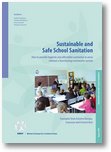 A new publication titled “Sustainable and Safe School Sanitation – How to provide hygienic and affordable sanitaiton in areas without a functioning wastewater system” is now available online (PDF; 4.4MB) from WECF (Women in Europe for a Common Future).
A new publication titled “Sustainable and Safe School Sanitation – How to provide hygienic and affordable sanitaiton in areas without a functioning wastewater system” is now available online (PDF; 4.4MB) from WECF (Women in Europe for a Common Future).
“School sanitation is an important but often neglected issue for public health. Children are most vulnerable and affected by poor sanitation conditions. Related diseases, particularly diarrhoea and parasite infections hinder the children´s physical and intellectual development. In a number of countries, evaluations have shown that pupils are dropping out of school due to bad toilet conditions.
This publication gives background on what are important issues to make school sanitation sustainable and success stories. The focus is on urine diverting dry school toilet (UDDT) systems …(which)…offer high quality and comfort. Because of the separation technology in the toilet device, these toilets do not smell or attract flies. For the operation, no water is used for flushing. Water is however needed for the hand washing facilities which are always included in the projects.
This publication is in particular intended for school directors and teachers, administration employees, engineers, architects and construction workers from the field and NGOs.”
The 28-paged publication contains examples from Eastern Europe, Caucasus and Central Asia.

2.5 billion people lack adequate sanitation, of which 280 million are children under the age of 5 years old. Over 4,000 children die every day from dirty water. Diseases from lack of sanitation kills more children than either malaria or AIDS, stunts growth and forces millions of adults and children alike to spend weeks at a time off work or school, which hits both a country’s economy and its citizens’ chances of a better future.
Lack of sanitation is the world’s biggest cause of infection. The majority of illnesses such as severe diarrhoea in the world are caused by faecal matter.
To tackle this issue Pump Aid has developed the Elephant Toilet. This is a low cost, technology appropriate design that communities are benefiting from and will continue to do so for many years to come. The Elephant Toilet has won the prestigious St.Andrews Prize for Environment 2008 for best design.
The concrete floor slab has two elephant shape ‘ears’ to stand on, a hole opening over the pit for solid matter to drop into, and an elephant’s ‘trunk’ that channels away urine into a compost pit. By keeping urine out of the pit, the faeces will decompose more easily as urine kills its useful bacteria.
To stop flies and odour a plastic bottle, with holes punched in for ventilation, is inserted at the top of the chimney. As it heats, it creates a convection process, causing a current of air to move through the toilet to help remove the scent of the pit. The light entering through the bottle attracts flies, which are then eliminated by the heat inside.
At the doorway of the toilet hangs a water container with a ball point pen barrel inserted near the bottom. To turn on the tap, the lid is taken off the pen, and then replaced to turn it back off. The simplicity of the design means that even the youngest children can learn this process. For soap, a Seso bush that has antiseptic qualities is planted outside the toilet. It is watered by the stream of waste water from hand washing.
When the pit is full (and it will take several years) the concrete floor slab is moved to a new pit and a fruit tree is planted on the old one. The fruit it produces supplements the diet of the local community and can be taken to market to bring much-needed income for the community.
The Elephant toilet costs just £20 to build, including all materials and labour costs, making them a high contender for the cheapest/most effective toilet solutions around.
Pump Aid has been chosen as the UK NGO partner to Live Earth 2010. On April 18th 2010 Live Earth returns, turning its attention and significant influence onto the global water challenge. The Live Earth Run for Water global events on 18th April 2010 will be the single biggest fundraising effort for water causes in history. More than 100 countries across the globe will participate in raising money for water causes by staging 6 kilometer run/walk events. London and Manchester will be hosting the UK events with all the funds raised going straight to Pump Aid projects.
The potential is massive so please get involved.